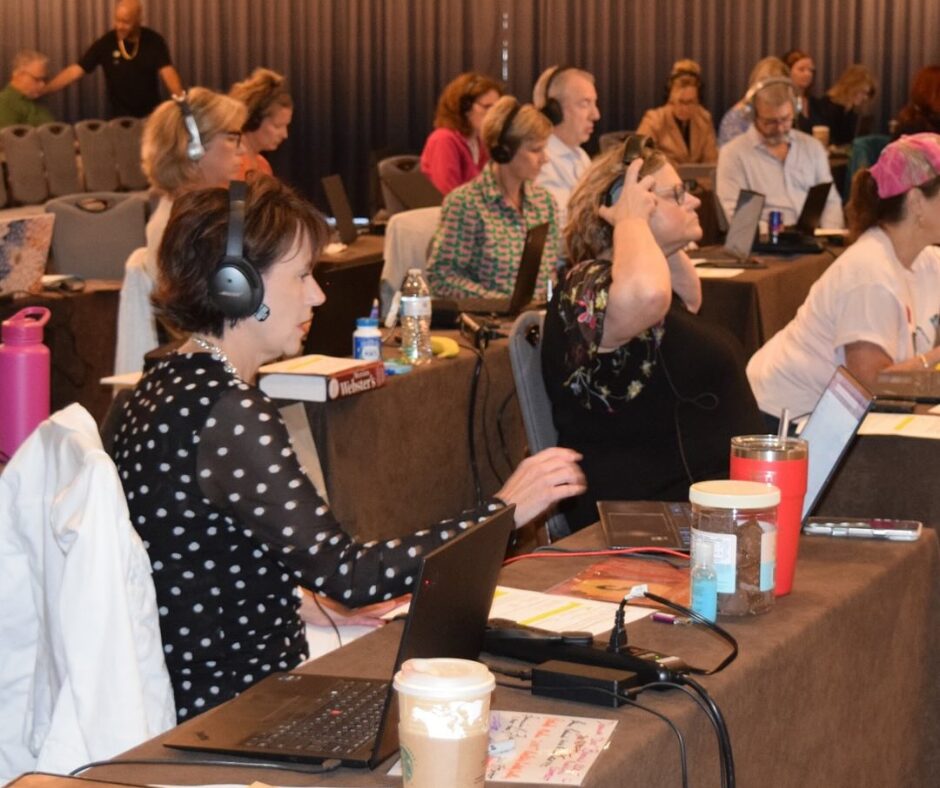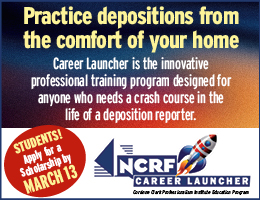By Ron Cook
Have you thought about going after that next certificate? Or maybe even contemplated giving a speed and/or realtime contest a go? Or maybe you’re a student trying to pass the next speed hurdle. What’s keeping you from taking and passing the RPR? How about the RMR? Why are you, as a student, seeming to take longer than you had anticipated to pass that next speed test?
Spoiler alert: There are some students and reporters who seem to stay cool, calm, and collected when taking tests and contests, but the vast majority of us don’t have ice in our veins. Truth be told, I’m guessing that 95 percent-plus have test nerves and serious ones at that.
Is it possible that we’re not focusing on the most important thing when we’re focusing on speed? Should we be focusing more on accuracy? I’m here to tell you that my opinion is that perhaps the mental side of speedbuilding and test-taking is the most important factor in upping your speed and accuracy. I’ve heard my good friend and amazing reporter and teacher Allie Hall, RDR, CRR, CRI, emphasize the mental aspect, but mostly it seems that those who aren’t progressing are continuing to do the same types of practice over and over expecting different results. I’m sure you’ve heard the saying that the definition of insanity is doing the same thing over and over expecting different results.
I’m here to tell you that my opinion is that perhaps the mental side of speedbuilding and test-taking is the most important factor in upping your speed and accuracy.
I am one who suffers hugely from test anxiety, and for the last several years I’ve been practicing trying to control my mind, my self-talk. I don’t suppose I’m the only one who is nailing a test/contest and then midway through starts saying, “I’m getting this. I’m really getting this.” As soon as that happens, the wheels fall off. I’ve been challenging myself to have a mindset that I’m better than that test/contest I’m about to take. “I own that test. Bring it on!”
I’m going to share with you a few things that I’ve been working on to be mentally tougher. The first one is the above mindset. I need to know that I can nail that speed and not find myself hanging on for dear life.
The second thing I do probably sounds counterintuitive. I’ve been working on intentionally dropping a multi-stroke word and then picking up with the next word. I find that by focusing on intentionally dropping a word, it keeps me from the “I’m getting it” self-talk. Also, I’m a writing perfectionist, and as soon as I hit a misstroke, my first inclination is to asterisk it out and correct it with the right word. I’m working hard at just letting it go. Mind you, in either of the above instances, an intentional dropped word or a misstroke that I can’t figure out, that is one mistake.
The next thing I do is try to listen for phrasing opportunities. I used to write with a fairly long theory, and for the last several years I’ve been working on shortening my writing. I find that as soon as things get hairy, I revert to stroking things out. I need to sit back just a hair so that I can hear (and write) the brief or phrase. I find that it helps me to keep relaxed and keep up with the speaker. Once again, because I’m preoccupied listening for briefs and phrases, I’m not doing the “I’m getting it!” self-talk.
I majored in physical education before I learned about court reporting, and I’m kind of a sports nut. Maybe you’ve heard athletes who are being interviewed say that once they slowed things down, their sport became so much more manageable. What they’re saying is that when they slowed things down mentally, they became much more in the moment, not overwhelmed with what was going on around them. So … work on mentally slowing down those words that are coming at you, because in actuality they’re probably not as fast as you believe they are.
This is kind of a weird concept, but perhaps it will resonate with you. I liken speedbuilding to driving down the freeway. As you’re driving at 65 miles per hour, if you’re looking straight ahead, everything coming at you, i.e. — cars, street signs, etc. — is coming at a reasonable pace. If you look directly to the side as you’re driving, it will appear that everything is blazing past you. If you look at the words you’re writing in the same way, all of a sudden they’re not so fast after all. In fact, if you listen to a particular take without writing on the machine, you might be surprised at how fast it’s not.
Those of you working reporters who have been thinking about increasing your speed or attaining the next certification, I suggest you start with the “Bring it on” mentality and go beat that test and get that cert. You students who might be stuck at a speed, perhaps change the mindset to a “Bring it on” mindset, not a “Well, I’m gonna try again and hope I pass” mindset.
Lastly, I want to emphasize that it behooves us all to be the best we can be, now more than ever. Not only will bettering yourself aid you for the rest of your career, but if we all rise to be better, we will be irreplaceable. Let’s go!
Ron Cook, FAPR, RDR, CRR, CRC, is a freelance court reporter and CART captioner living in Redmond, Wash. He can be reached at mr.realtime@comcast.net.
This article appeared in the July issue of the JCR Magazine. The full issue is available online here.










